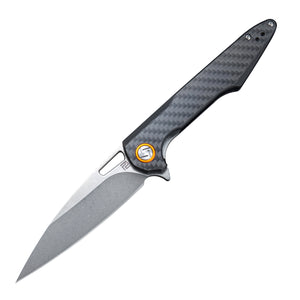Flipper knives have gained popularity among knife enthusiasts and everyday users alike due to their unique design and functionality. Understanding the anatomy of a flipper knife is essential to fully appreciate its features and capabilities. In this article, we will delve into the intricacies of flipper knives, exploring their design and functionality in detail.

The Anatomy of a Flipper Knife
Flipper knives consist of several key components that contribute to their overall design and functionality. These components include the blade, handle, pivot, flipper tab, and locking mechanism.
The Blade
The blade is the most crucial part of any knife, and flipper knives are no exception. The blade of a flipper knife is typically made from high-quality stainless steel, known for its durability and corrosion resistance. It is designed to be sharp and versatile, allowing for various cutting tasks.
Flipper knives often feature a tanto, drop point, or clip point blade shape. Each blade shape offers unique advantages, such as enhanced piercing ability or increased control during slicing motions. The blade may also have a plain edge, serrated edge, or a combination of both, depending on the user's preferences.
The Handle
The handle of a flipper knife provides a comfortable and secure grip for the user. It is usually made from materials like G-10, carbon fiber, or titanium, which offer excellent strength and durability. The handle may also feature textured patterns or ergonomic contours to enhance grip and prevent slippage.
Some flipper knives incorporate additional features into the handle, such as a pocket clip for convenient carry, a lanyard hole for attachment options, or even a glass breaker for emergency situations. These features add versatility and functionality to the knife.
The Pivot
The pivot is the mechanism that allows the blade to rotate smoothly within the handle. It consists of a pivot screw and washers or bearings. The pivot plays a crucial role in the overall functionality of a flipper knife, as it determines the smoothness of the blade deployment and the ease of opening and closing the knife.
Flipper knives often utilize ball bearings or washers in the pivot system to reduce friction and ensure effortless blade deployment. This allows for quick and reliable one-handed opening, making flipper knives ideal for everyday carry and tactical use.
The Flipper Tab
The flipper tab is a distinctive feature of flipper knives. It is a small protrusion on the spine of the blade that serves as a lever for opening the knife. To deploy the blade, the user applies pressure to the flipper tab, causing the blade to rotate out of the handle.
The flipper tab offers several advantages over other opening mechanisms. It allows for smooth and rapid blade deployment, even with gloves or in challenging conditions. Additionally, the flipper tab acts as a guard, preventing accidental blade closure during use.
The Locking Mechanism
The locking mechanism ensures that the blade remains securely in place during use, preventing accidental closure and enhancing user safety. Flipper knives commonly employ locking mechanisms such as liner locks, frame locks, or axis locks.
Liner locks are one of the most popular locking mechanisms in flipper knives. They consist of a metal liner that moves into position behind the blade when opened, preventing it from closing unintentionally. Frame locks are similar but utilize the handle frame itself as the locking mechanism. Axis locks, on the other hand, employ a spring-loaded bar that engages with the blade tang, providing a secure lockup.
Understanding the Functionality of Flipper Knives
Flipper knives are designed to offer quick and easy one-handed blade deployment, making them highly functional for a variety of tasks. The flipper tab, combined with the smooth pivot system, allows for rapid and reliable opening with minimal effort.
Furthermore, the locking mechanism ensures that the blade remains securely in place during use, providing confidence and safety to the user. This feature is particularly important for tasks that require a stable and secure cutting edge.
Flipper knives excel in everyday carry scenarios, as their compact size and versatile blade designs make them suitable for a wide range of cutting tasks. Whether it's opening packages, preparing food, or performing light-duty chores, flipper knives offer the convenience and functionality needed for everyday use.
Conclusion
Understanding the anatomy and functionality of flipper knives is essential for anyone interested in these versatile tools. The combination of a well-designed blade, ergonomic handle, smooth pivot system, flipper tab, and reliable locking mechanism makes flipper knives a popular choice among knife enthusiasts and everyday users.
By exploring the intricacies of flipper knives, we gain a deeper appreciation for their design and functionality. Whether you're a collector, outdoor enthusiast, or someone looking for a reliable everyday carry tool, flipper knives offer a unique blend of style and functionality.
For more information on flipper knives and related topics, please visit the following credible sites:








